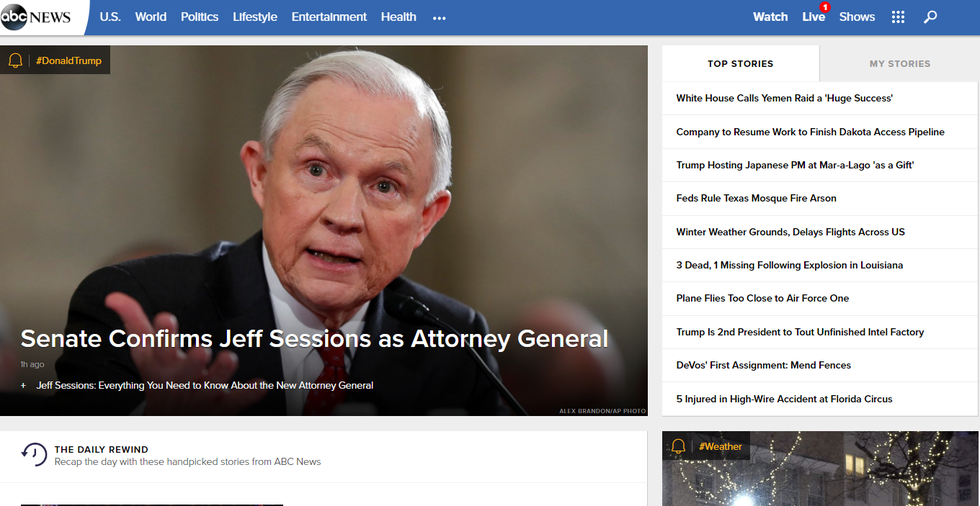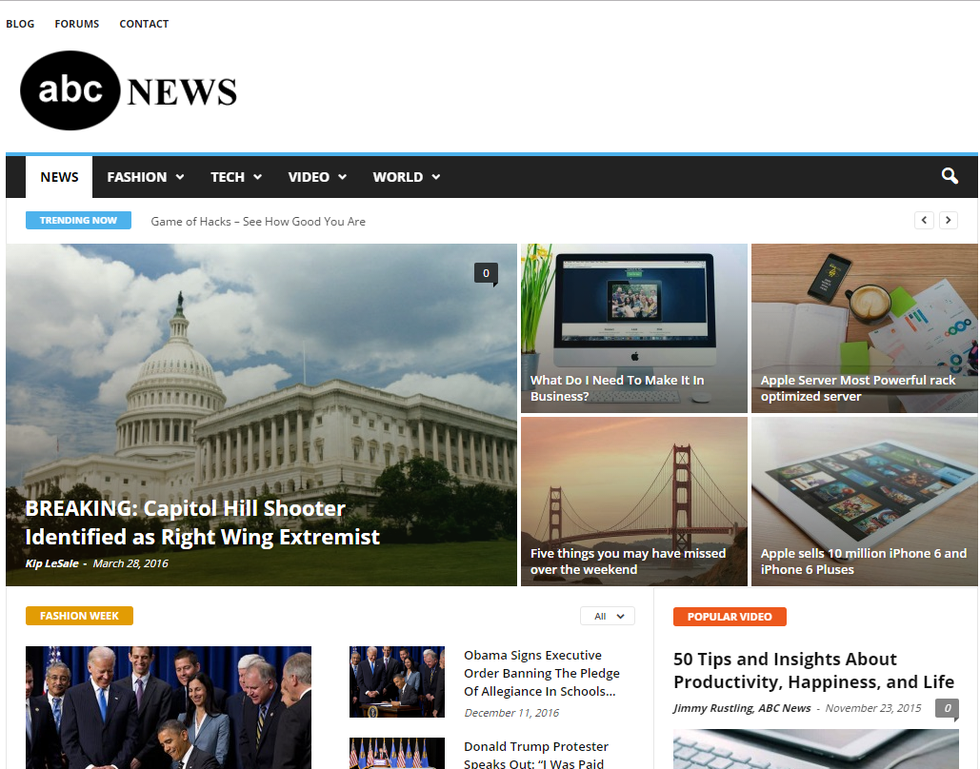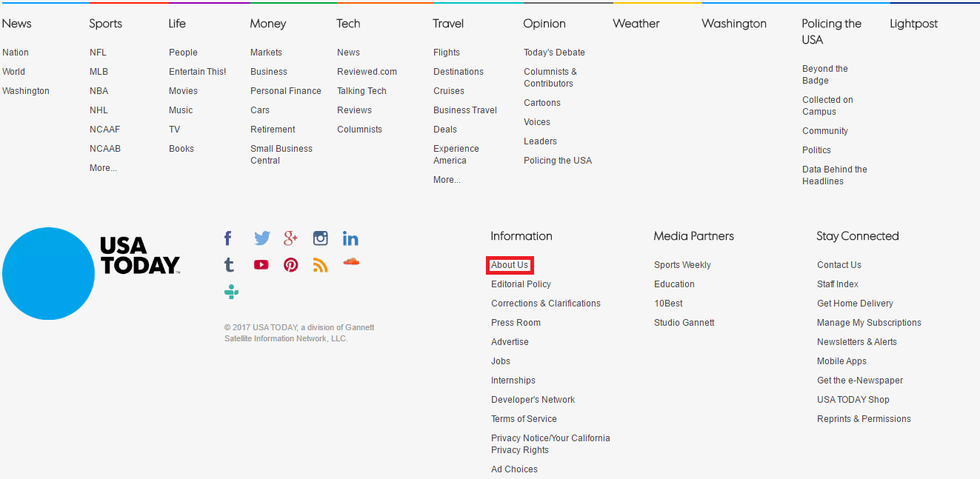In a world where the media is constantly bombarding us with information, it is the duty of every citizen to remain knowledgable about what is and isn't true. It's easy to be misguided or confused by a constant barrage of biased news stories, but if we don't remain informed and aware of the world, we risk being used by whoever is spreading their agenda the loudest.
In order to keep from being fooled by outrageous news (especially when the truth is just as crazy) you should follow a few steps to see if the news is worth following.
1. Check The Website's URL
This might not be apparent at first, but oftentimes the first place to look is the address of what you are looking at. Many fake or biased news websites will disguise themselves as more reputable websites in order to deceive the reader. Sometimes they are very difficult to distinguish from the real deal. For example, look at the official abc news website abcnews.go.com:
This is the front page (as of writing) of the official ABC News website. Note the logo at the top left, with the familiar shiny circle. Scrolling through, you can find references to abc's 20/20 news program, and copyright information mentioning abc news networks and other information.
Now look at abcnews.com.co:
The logo is ovicular, and it lacks the familiar "shine" that gives it depth. Scrolling through leads to this quote:
Thanks to ABC News President & CEO, Dr. Paul "Un-Buzz Killington" Horner for making ABC News the greatest website in the multiverse. We need writers! Contact us! Looking to advertise?
Not only is this much less professional than the official news website, but also searching Paul Horner's name will lead to links stating that he is a creator of fake news websites. It is also unlikely that any reputable source will place any kind of hiring notice on their front page, least of all with exclamation points. Be wary of the urls you click, little details like ".co" vs ".com" can be hugely important.
Not all websites are "fake" per se, sometimes legitimate news sources will have an agenda or purpose to their reporting. Though this isn't always the case, it may be good to check out what your favorite websites lean towards.
2. Look at the "About Us" section
A well designed website will allow you to see what the websites purpose is, what its history is, and who is affiliated with it. For instance, if you were to find a news story from USA Today, you would be able to learn more about the website by scrolling all the way to the bottom of the page, and finding their information page (9 times out of 10 it will be titled "About Us).
Following this will lead you to a page giving some kind of statement about their purpose and policy for news. USA Today states:
"Through its unique visual storytelling, USA TODAY delivers high-quality and engaging content across print, digital, social and video platforms. An innovator of news and information, we reflect the pulse of the nation and serve as the host of the American conversation — today, tomorrow and for decades to follow. We reach nearly three million readers daily, and our mobile applications attest to more than 22 million downloads on mobile devices
Now, there is nothing in this statement about a certain viewpoint being offered, or a particular population they serve, which is certainly a good sign, but the focus on the number of readers (In my opinion) implies a more "click-bait-y" style that is focused on readership rather than facts. Compare to the Infowars "About The Alex Jones Show" section:
Since the beginning of time there have been constant attempts to enslave and subdue the spirit of humanity. From Barbarian hordes streaming down the mountain to the Stasi secret police torturing those who dreamed to be free.
Already there is a clearly panicked and terrorizing kind of tone, trying to convince you of the viewpoint that there is a conspiracy against freedom of speech and honesty. This may be true, this might not be, but this particular website is determined to convince you that it is. Further down, we see a very honest and direct explanation of their bias:
Jones is dedicated to libertarian and constitutionalist ideas, in addition to what he has coined "1776 worldwide" - promoting a true culture of liberty, transparency and freedom on a planetary scale to empower humanity, while vehemently opposing Agenda 21 and the globalist threat to national sovereignty.
So, if you are interested in the opinions or viewpoints as professed by people with libertarian or constitutionalist perspectives, this is perfectly acceptable; However, if you are looking to this website for absolute facts, then perhaps it would be best to look elsewhere.
On the other side of the political spectrum, the Occupy Democrats website gives an equally direct admission of their bias:
Founded in late 2012, Occupy Democrats is a political organization and information website that provides a new counterbalance to the Republican Tea Party. The Occupy Movement changed the national conversation around the issue of class and inequality, but unlike the Tea Party, it failed to achieve legislative victories.
The Republican Tea Party is a very conservative political movement, and as such, this website will be espousing and pursuing news topics from a more liberal agenda. But sometimes websites aren't going to give you their bias so quickly, what then?
3. Just Google the Website (Or Wikipedia)
Perhaps the most important piece of advice for any modern citizen, just googling the website can give quite a bit of information about a website.
In my search for examples above, I noticed that many websites lack an easily accessible "About" section. Breitbart News, for instance, focuses more heavily upon merchandising than divulging their political stance. A search will provide many links, but perhaps the easiest to read is the Wikipedia article that shows up (Wikipedia is just as reputable as the Encyclopedia Britannica). A Wikipedia article will provide somewhat bare-bones summary of what the website is about, but it will also give information such as the website's history, founders, and sometimes donors or other information. In addition, a good wikipedia article will contain a large number of citations for confirming any information contained. In the Brietbart article we can see that Breitbart news:
Was founded by "conservative" entrepreneur Andrew Breitbart who wanted it to be "...unapologetically pro-freedom and pro-Israel"
Has Been Heavily criticized by the New York Times for "ideologically driven journalists" that generates controversy "over material that has been called misogynist, xenophobic and racist". (Though its proponents deny this)
Has also been criticized by: The Southern Poverty Law Center, The Anti-Defamation League, and The Jewish Daily Forward, among others.
In a section further down, one can see that many of the websites "controversial stories" involve editing of videos (supplied by them as evidence) to misrepresent the facts and incite outrage.
Once again, to be fair, here is another example of how a quick search can reveal large problems with a news website.
U.S. Uncut was originally "a decentralized direct action group" intended to draw attention to tax avoidance, cuts to social support spending, and public sector jobs. Not necessarily the worst intent, but they have a clear agenda to promote. the issues come from the history section, which states:
In April 2011, in political action to highlight corporate tax avoidance, US Uncut published a news story based on a fake press release that said General Electric was returning its 3.2 billion dollar tax refund to the U.S. Treasury
Regardless of your political stance or agenda, basing news articles upon fake press releases is a poor standard to set for yourself. Further down, we see more citations linking to criticism of this website being liberally biased, deceptive, and inaccurate.








 Founded in late 2012, Occupy Democrats is a political organization and information website that provides a new counterbalance to the Republican Tea Party. The Occupy Movement changed the national conversation around the issue of class and inequality, but unlike the Tea Party, it failed to achieve legislative victories.
Founded in late 2012, Occupy Democrats is a political organization and information website that provides a new counterbalance to the Republican Tea Party. The Occupy Movement changed the national conversation around the issue of class and inequality, but unlike the Tea Party, it failed to achieve legislative victories. 
















